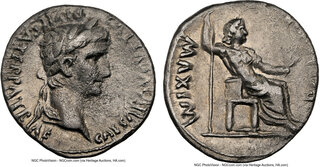Lot description:
Ancients
Augustus (27 BC-AD 14). AR denarius (19mm, 3.47 gm, 7h). NGC XF 4/5 - 1/5. Lugdunum, AD 13-14. CAESAR AVGVSTVS-DIVI F PATER PATRIAE, laureate head of Augustus right / PONTIF-MAXIM, Livia, as Pax, seated right, feet on stool, grounded scepter in right hand, olive branch in outstretched left. RIC I 220.
Born on 23 September 63 BC into a wealthy plebeian family, Augustus, originally Gaius Octavius, was the grandnephew and posthumously adopted son of Julius Caesar. This inheritance set him on a collision course with Rome's political elite, leading to the formation of the Second Triumvirate with Marc Antony and Marcus Aemilius Lepidus. Their initial unity against Caesar's assassins eventually gave way to conflict, from which Augustus emerged as Rome's first true emperor after victories in key battles like Philippi and Actium. In 27 BC, he was honored with the title "Augustus" by the Senate, signaling the start of his reign and the Pax Romana, a golden era of peace, prosperity, and cultural flourishing that lasted over two centuries.
Augustus' rule saw significant military, administrative, and cultural reforms that stabilized and enriched the empire. He established a standing army, including the Praetorian Guard, reorganized Rome's provinces, and became a patron of the arts, fostering the careers of poets like Virgil and Horace and commissioning monumental buildings that reshaped Rome. His savvy use of coinage to communicate his achievements and vision helped solidify his power and legacy. Augustus died in AD 14, he left behind a transformed Rome. Through Suetonius's "The Twelve Caesars" and his own "Res Gestae Divi Augusti," we glimpse the life and achievements of a ruler who balanced autocracy with republican ideals, setting a precedent for future emperors and leaving an indelible mark on Roman history.
https://coins.ha.com/itm/ancients/roman-imperial/ancients-augustus-27-bc-ad-14-ar-denarius-19mm-347-gm-7h-ngc-xf-4-5-1-5/a/61373-22043.s?type=DA-DMC-CoinArchives-WorldCoins-61373-05052024
HID02906262019
© 2024 Heritage Auctions | All Rights Reserved |  |